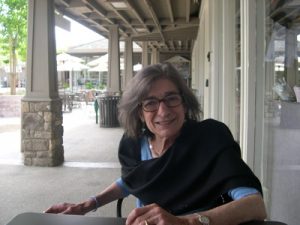The Only Way Up is Down: Rachel Jacoff on Dante's Inferno
December 7, 2017
:quality(75)/https%3A%2F%2Fdev.lareviewofbooks.org%2Fwp-content%2Fuploads%2F2017%2F12%2FDanteDetail.jpg)
Listen to the episode
The Only Way Up is Down: Rachel Jacoff on Dante's Inferno
00:00/00:00
“Almost everyone can find their own mid-life crisis in this language." – Rachel Jacoff
The world of Dante scholars is a small and close-knit one, and Rachel Jacoff is one of its leading luminaries. In this Entitled Opinions conversation, she discusses The Divine Comedy, and more particularly The Inferno, with her former student, our Entitled Opinions host Robert Harrison, himself a major Dante scholar.
They begin with the setting of the Divine Comedy, and the spiritual, existential, biographical, and political crisis in which it is born. The epic poem takes place in the Jubilee year 1300, when the Florentine was 35 years old, at the midpoint of his life. He was in the middle of two prose works he couldn't finish, Convivio and De Vulgari Eloquentia. Instead, he undertakes the major work for which he is most remembered, The Divine Comedy.
Entitled Opinions host and guest discuss the great poem's background, the spiritual crisis that gave birth to it, the mysterious role of Virgil as Dante's guide, and the role of women in the drama (both as mediators to Dante's spiritual climb, and as sexual sinners in the Inferno). And, inevitably, they discuss the renowned Canto V, with the adulterous lovers Francesca da Rimini and Paolo Malatesta.
The discussion begins with the First Canto, and Harrison's comments on the Florentine's immortal opening to his Divine Comedy. Dante has hit an impasse in his life, and the only way up is down.
“Sometimes the living adopt their ancestors, but sometimes the dead have a way of adopting the living.” – Robert Harrison

Rachel Jacoff's major research interest is Dante's Divine Comedy. She has written many articles on Dante and co-authored a monograph on "Inferno II" (University of Pennsylvania Press) for the Lectura Dantis Americana series sponsored by the Dante Society of America. She edited a collection of essays by John Freccero, Dante: The Poetics of Conversion (1986), which received Honorable Mention for the Marraro Prize from the Modern Language Association. She co-edited and contributed two essays to The Poetry of Allusion: Virgil and Ovid in Dante (1990). She also edited The Cambridge Companion to Dante (1993, 2007). She also co-edited The Poet's Dante, a collection of essays by 20th-century poets.
She has received fellowships from the National Endowment for the Humanities (1981-1982, 1991-1992), the Guggenheim Foundation (1993) and has been a fellow of the Bunting Institute, the Harvard Center for Renaissance Studies (Villa I Tatti), the Stanford Humanities Center, the Rockefeller Foundation's Villa Serbelloni, and the Bogliasco Foundation's Liguria Study Center. She was a Phi Beta Kappa Visiting Scholar in 1996-1997. She served as an assistant editor of Speculum, the journal of the Medieval Academy, and on the Advisory Board of the Stanford Humanities Center, the MLA Committee for the Teaching of Foreign Languages and Literature, and the Friends of the Harvard College Libraries. Her current research concerns Dante's role in contemporary poetry, Dante and the visual arts, and the representation of the body in the Divine Comedy.
She is Margaret E. Deffenbaugh and LeRoy T. Carlson Professor Emerita in Comparative Literature and Professor of Italian at Wellesley College where she has been a member the faculty since 1978. She has also taught at the University of Virginia, Cornell, and Stanford. She received her B.A. with High Honors and Distinction in 1959 from Cornell University, an M.A. in English from Harvard in 1960 and the Ph.D. degree in Italian from Yale in 1977.
Did you know LARB is a reader-supported nonprofit?
LARB publishes daily without a paywall as part of our mission to make rigorous, incisive, and engaging writing on every aspect of literature, culture, and the arts freely accessible to the public. Help us continue this work with your tax-deductible donation today!